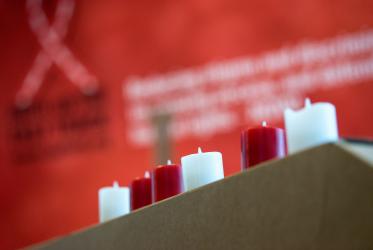As Rev. Pauline Wanjiru Njiru preached on 18 June at the Malawi United Methodist Church in Blantyre, she acknowledged that parenting adolescents is not an easy task.
Njiru preached on Luke 2:41-52, the story of how, when Jesus’s parents went to the festival of Passover, they left for home and Jesus, who was 12 years old, stayed behind in Jerusalem. His parents thought he was part of their traveling party, and didn’t realize for a day. They returned to Jerusalem and, after three more days, they found him in the temple courts, sitting among the teachers, listening to them and asking them questions.
Njiru, who is eastern Africa regional coordinator for the World Council of Churches Ecumenical HIV and AIDS Initiatives and Advocacy (WCC-EHAIA) reflected on this story, asking how we can amplify the voices of young people.
EHAIA helps local communities learn how to create intergenerational “safe spaces” in which children, adolescents, young people, families, faith communities and school personnel can have honest conversations about age-appropriate sex education, as well as HIV and sexual gender-based violence, one of the major drivers of new HIV infections across different age groups.
Njiru reflected that, when Jesus was 12, his parents assumed he was still a young boy who would follow them unquestioningly. “What are some of the assumptions that the parents and church leaders have about the whereabouts of the young people?” Njiru asked. “When you realize that your child is not with you, what action do you take?”
Parents think the children are lost while the young people are adventuring, said Njiru. “At what point do parents realize that their children are no longer children?”
The beauty in this story is that Mary, Joseph and Jesus agree to go home together. “Let us create safe space of mutual understanding where all of us can be heard and understood,” she said.
Unpacking responsibilities as young women
Njiru’s sermon was given in connection with training hosted at the same church. Thirty-five clergy wives and women leaders from all the twenty-one circuits of the United Methodist Church in Malawi attended.
The women got an opportunity to unpack their responsibilities as church leaders, wives and mothers. They acknowledged that sexual gender-based violence was a lived reality even in their circles and their communities.
The women used contextual Bible study open their engagement with the word of God. They also discussed why people continue to bear the brunt of HIV because of stigma, shame, denial, discrimination, inaction and mis-action. They learned about the SAVE methodology, which stands for Safer practices, Access and availability of medication, Voluntary counseling and testing, and Empowering communities with skills.
Participants committed to educate their communities and churches, and to create more awareness of “safe spaces” to talk about these issues at home, school, and within the community.
Adolescent girls speak out
During a workshop held especially for them, adolescent girls expressed their energy and determination to serve and live for Christ. At the same time, they admitted their fears stood like tall mountains in front of them.
Many of them described how they felt engulfed by a culture and religion which pushes them into a corner and denies them a voice or a safe space in which to speak out.
Some said they do not feel safe in school because some of the teachers demand sex in exchange for learning. Some do not feel safe at home because their relatives sexually molest them. Some felt their church was an unsafe place since some pastors were also demanding sex from them.
The young girls named culture as a major cause for their vulnerability to HIV infections. In some cultures the concept of the “hyena” is still practiced: the community identifies a man who is named the hyena and his job is to break a girl’s virginity in readiness for marriage.
The girls attending the workshop shared how one hyena infected 20 girls in one community with HIV. The hyena was taken to court but was exonerated arguing that he was not responsible for the HIV transmission, and that the culture was responsible.
Information on Ecumenical HIV and AIDS Initiatives and Advocacy








